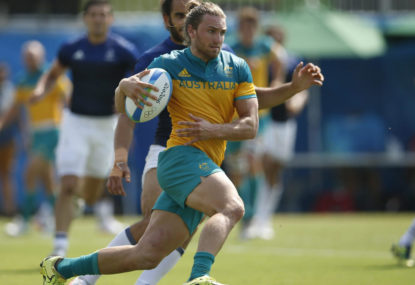The first Olympic rugby sevens is now over, with gold medals going to Australia and Fiji. The tournament was highly entertaining, producing upsets, drama, and a highly popular winner in the men’s event.
Looking for a moment just at the men’s side, after sevens was accepted into the Games, World rugby boss Brett Gosper said he hoped a lot of 15-a-side stars would take part, in order to showcase the sport, and show the IOC how seriously rugby took the honour.
In the end, few regular players of the longer code made the trip at all, let alone stars, but the Olympic sevens didn’t suffer as a spectacle.
In the aftermath of the All Blacks’ relatively poor showing in Rio, there were some calls in New Zealand to force top players to make themselves available, should the sevens coach want them. Steve Hansen has come out against that view, arguing you shouldn’t make anyone play a game they don’t want to play.
He also saw the advantage for the 15-a-side game that players value the chance of a full All Black place so highly.
New Zealand plan to look into the factors behind their lack of Olympic success. There are a lot of good thinkers about the sport over there, so their conclusions will be interesting.
Then again, the New Zealand Rugby Union must have given it a lot of thought before, so it does raise the question of whether any union is really capable of managing a successful regular season sevens team, a leading 15-a-side team, and an Olympic sevens campaign all together.
As the cycle is currently set, the Olympic sevens is always going to take place around nine months after a World Cup.
The 2015 World Cup finished on the 31st October; the World rugby sevens series ran from December 4 2015 to 22nd May 2016; while the athletes all gathered for the Olympics in the first week of August 2016.
SANZAAR players committing straight to sevens after a World Cup, lose a season of Super Rugby, and the June Tests against visiting sides. Before his injury, Sonny Bill Williams hoped to appear in the Rugby Championship, so the whole season isn’t necessarily lost to sevens.
Northern Hemisphere players committing straight to sevens after a World Cup, lose a whole season of domestic rugby, the Six Nations and the June Tour.
Do you need to commit to sevens so early? USA coach Mike Friday has argued that it only takes ten weeks to give a 15-a-side player the fitness and awareness for the shorter code but this claim remains unproven.
Friday did name Chris Wyles to his Olympic squad, after the player had completed a full club season for Saracens in England, but Wyles is a former USA sevens captain. Team GB also named some 15-a-side players but they all had experience in sevens.
On the other hand, the fact players like Quade Cooper, Liam Meesam and Bryan Habana couldn’t make their respective Olympic squads suggests conversion might not be as easy as Friday believes. Perhaps switching as early as Sonny Bill Williams did is the only realistic route for a player to find his feet in a different code.
If that’s the case, the Unions have a problem.
It may seem that the first year after a 15-a-side World Cup is the least significant from a development perspective, since there’s plenty of time to get back into contention.
However, most teams don’t have good World Cups. Even without players retiring, or coaching teams being replaced, the first year after a tournament often sees a lot of changes, and many of them set the tone for the next four year cycle. It’s a brave player who takes himself out of contention at such a time, confident he can return to take the jersey back.
Steve Hansen may be right that you shouldn’t force anyone into the shorter code, but players are currently being asked to make a commitment without a safety net, so to speak. There’s no guarantee top players switching to sevens will actually make the grade, while they can’t be certain they’ll slot back into the pecking order at the same level when they return.
There’s another small complication over qualification. Australia eventually qualified for Rio last November by winning the Oceania round. However, the last place was only decided as late as June 2016, when Spain beat Samoa in the repechage tournament.
As it currently stands, automatic qualification only goes to the top four teams in the world sevens series ending over a year before the Olympics (which happened to be Fiji, SA, New Zealand and GB, for this Games).
The Oceania qualification round is one of the toughest. Even with New Zealand and Fiji not included, Australia still had to overcome Samoa and Tonga. Imagine how hard that group would be if only one Oceania team had automatically qualified.
There’s no guarantee that the repechage round will be a cakewalk in the future either. It wasn’t for Samoa even these year. In Europe, GB, France, Spain, Portugal, Russia and Georgia are no pushovers, with Ireland also looking to develop their programme. North America has Canada and USA, while if both South Africa or Kenya fail to qualify automatically, then one of those sides will be competing in the repechage.
In short, it’s quite possible in the future that top players will be confronted with the task of fighting for a place in the national sevens team, without being certain that the team will even make it to the Olympics.
Perhaps we should stop speculating now about whether 15-a-side stars can even go for Olympic gold because that ship might well have sailed.





























































































